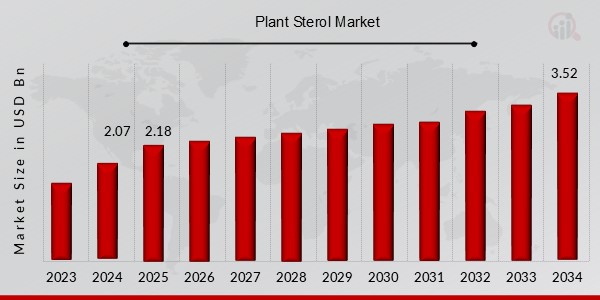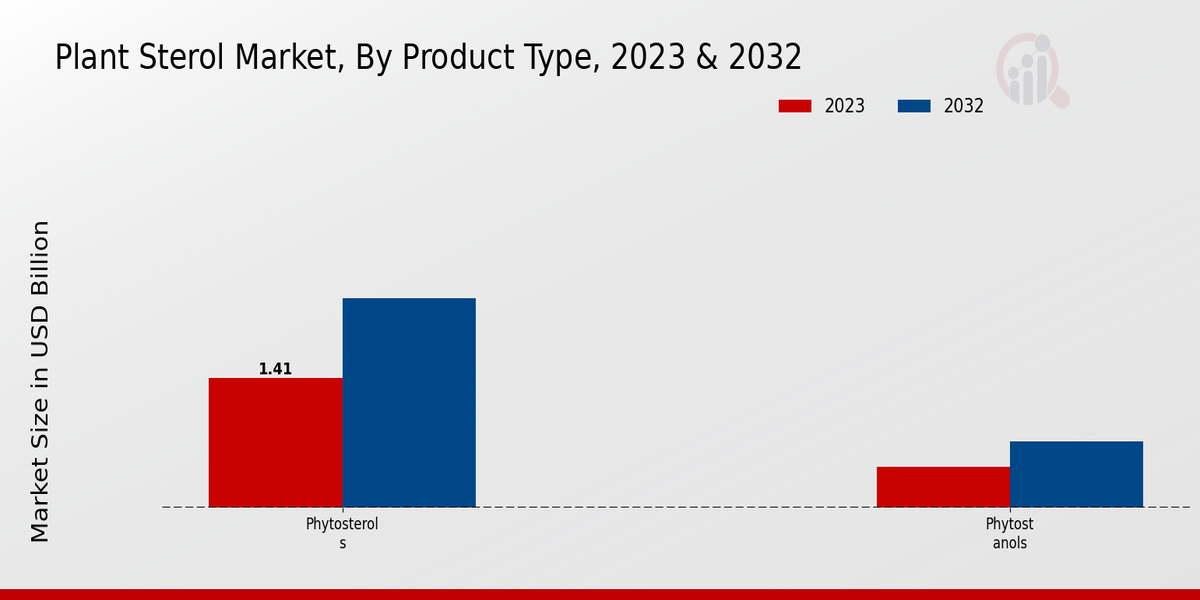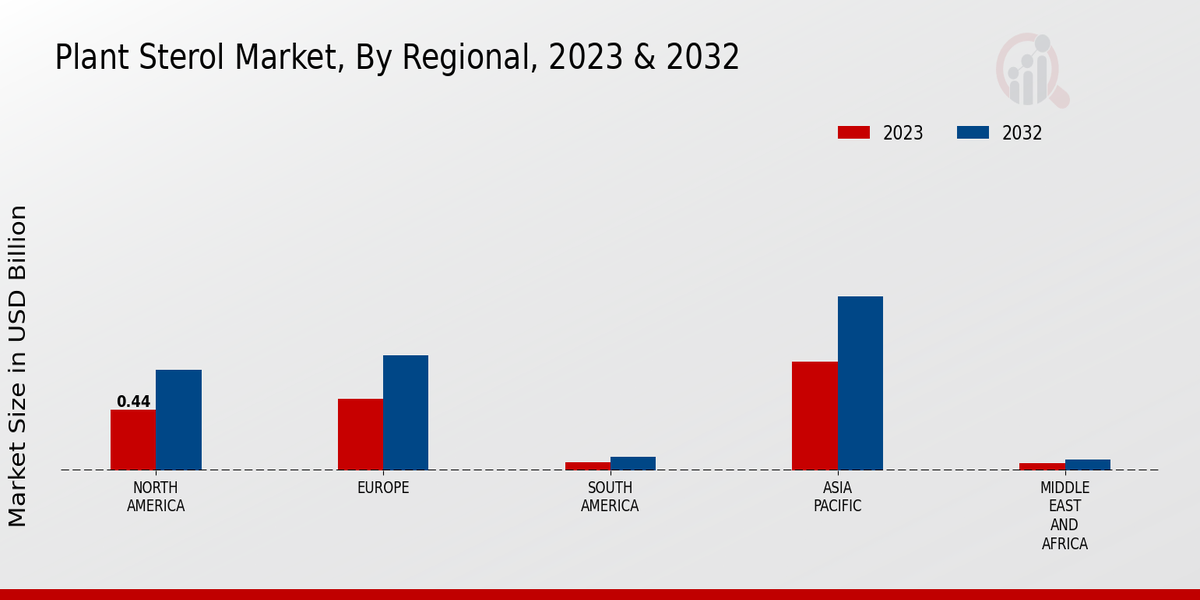Global Plant Sterol Market Overview
The Plant Sterol Market Size was estimated at 2.07(USD Billion) in 2024. The Plant Sterol Industry is expected to grow from 2.18(USD Billion) in 2025 to 3.52(USD Billion) by 2034. The Plant Sterol Market CAGR (growth rate) is expected to be around 5.50% during the forecast period (2025 - 2034).
Key Plant Sterol Market Trends Highlighted
Key market drivers for plant sterols include rising health consciousness, increasing prevalence of chronic diseases, and growing demand for functional foods and dietary supplements. Plant sterols are gaining recognition for their ability to lower cholesterol levels, reduce the risk of cardiovascular diseases, and improve overall health. Opportunities exist in the development of novel plant sterol-based products, such as fortified foods, beverages, and nutraceuticals.Recent trends in the plant sterol market include the shift towards plant-based diets and the growing popularity of personalized nutrition. Consumers are seeking natural and sustainable health solutions, driving the demand for plant-based alternatives to cholesterol-lowering medications.
Additionally, the market is witnessing the emergence of innovative technologies, such as microencapsulation and nanotechnology, which enhance the bioavailability and efficacy of plant sterols.

Source: Primary Research, Secondary Research, Market Research Future Database and Analyst Review
Plant Sterol Market Drivers
Rising Consumer Awareness about Health Benefits
Plant sterols, a class of naturally occurring compounds found in plants, have gained increasing attention in recent years due to their potential health benefits. Extensive research has highlighted their ability to lower cholesterol levels, reduce the risk of cardiovascular diseases, enhance immune function, and alleviate menopausal symptoms. As consumers become more aware of these benefits, the demand for plant sterol-enriched products is expected to surge.This heightened awareness is primarily driven by ongoing health campaigns, government initiatives, and media coverage emphasizing the importance of maintaining a healthy lifestyle.
Consequently, the Plant Sterol Market is poised to witness robust growth as consumers seek natural and effective ways to improve their overall well-being. The rising prevalence of chronic diseases, particularly cardiovascular diseases, has further fueled consumer interest in plant sterols.The growing incidence of obesity, unhealthy diets, and sedentary lifestyles has led to an increased risk of developing cardiovascular issues. As a result, consumers are actively seeking preventive measures to maintain heart health, and plant sterols have emerged as a promising option.
Extensive clinical trials and scientific studies have demonstrated the efficacy of plant sterols in reducing cholesterol levels, improving lipid profiles, and reducing the risk of cardiovascular events.This has significantly contributed to the positive perception of plant sterols among consumers, driving market growth. Furthermore, the increasing popularity of plant-based diets has played a significant role in boosting the demand for plant sterols. With the growing vegan and vegetarian populations, there is a heightened demand for plant-based alternatives to animal-derived products.
Plant sterols offer a natural and effective solution for vegans and vegetarians to maintain healthy cholesterol levels and reduce the risk of chronic diseases.As the plant-based trend continues to gain momentum, the market for plant sterols is expected to benefit from the growing consumer base seeking healthier and more sustainable dietary options.
Technological Advancements and Product Innovations
The plant sterol market has significantly benefited from the development of new technologies and products. There have been ongoing research and development efforts aimed towards developing new and improved plant sterol formulations. These have enhanced the efficacy and bioavailability of the products, making them easier for the consumers to use. On the other hand, plant sterols have been included in a myriad of food formulations. For example, companies are incorporating plant sterols into spreads and food products.This makes the consumption of plant sterols easier and more convenient for the members of the public.
In addition, products such as dairy alternatives and juices have been made using plant sterols. This is another technological advancement that has contributed to the growing popularity of plant sterols. The use of nanotechnology and microencapsulation is also an important innovation that has led to the creation of more effective plants sterols.For example, the formulation of nanoparticles has led to the creation of more soluble and stable plant sterols. The nanoparticles are essential because they can be used in the targeting of plant sterols to specific areas of the body. Therefore, they are more effective than non-targeted delivery systems.
It can, therefore, be seen that the plant sterol market will continue to benefit from new delivery systems and applications.
Government Regulations and Supportive Policies
Government regulations and supportive policies have been the driving forces in the development of the Plant Sterol Market. Notably, a range of countries have adopted various regulations and guidelines to make people use more plant sterols to improve the health of the citizens. For example, different regulations establish maximal permissible levels of plant sterols in enriched foods, proceed with the requirements specifically related to labeling and health reasons frameworks, and proceed with economic incentives for developing and using plant sterol in enriched foods.Thus, the government support of plant sterol is based on a range of factors.
First, this support is provided due to the understanding of their health benefits. The governments launch supportive policies and regulations to reduce economic losses of the country caused by cardiovascular diseases and other chronic illnesses. Additionally, they provide their support through tax breaks and research funding to ensure continuous innovation in the development of plant sterol enriched foods.The range of supportive policies ensured that a great number of products were introduced within the global market.
Therefore, governmental support is a crucial factor in driving the plant sterol market, and these incentives are likely to be present in the future that is promising for the global market of plant sterol in general.
Plant Sterol Market Segment Insights
Plant Sterol Market Product Type Insights
The Plant Sterol Market is segmented by product type into phytosterols and phytosterols. Phytosterols are plant-based compounds that are structurally similar to cholesterol, but they have no cholesterol-raising effects. Phytosterols are found in vegetable oils, nuts, seeds, and legumes. Phyto stanols are saturated plant sterols that are produced by hydrogenating phytosterols. Phyto stanols are found in fortified foods, such as margarine, spreads, and milk.
The phytosterols segment is expected to account for a larger share of the Plant Sterol Market during the forecast period.The growth of this segment is attributed to the increasing awareness of the health benefits of phytosterols, such as their ability to lower cholesterol levels and reduce the risk of heart disease. Phytosterols are also used in the production of functional foods and beverages, which is further driving the growth of this segment. The phytosterols segment is also expected to grow at a significant rate during the forecast period.
The growth of this segment is attributed to the increasing demand for fortified foods and beverages. Phyto stanols are also used in the production of dietary supplements, which is further driving the growth of this segment.Overall, the Plant Sterol Market is expected to grow at a healthy rate during the forecast period. The growth of this market is attributed to the increasing awareness of the health benefits of plant sterols, the rising demand for fortified foods and beverages, and the growing popularity of dietary supplements.

Source: Primary Research, Secondary Research, Market Research Future Database and Analyst Review
Plant Sterol Market Application Insights
The Application segment of the Plant Sterol Market is segmented into Food and Beverages, Dietary Supplements, Pharmaceuticals, Cosmetics, and Animal Feed. In 2023, the Food and Beverages segment occupied the largest market share, which was equal to 30%, and it is expected to remain the leader during the forecast period. The factor that positively affects the growth of the segment is the increasing demand for plant-based food, as well as the growing popularity of products that are enriched with plant sterols.
Moreover, consumers are increasingly aware of the benefits of the latter for their health.The Dietary Supplements segment is also expected to increase significantly due to the popularity of organic and natural supplements. The Pharmaceuticals segment is expected to show moderate growth as well because the number of patients with chronic disease increases, and many new drugs are made from plant sterols. The Cosmetics segment will demonstrate average growth due to the increasing use of plant sterols in skincare and haircare ranges.
The Animal feed segment will show the slowest growth, as plant sterols are used in animal feed formulations to a limited extent.
Plant Sterol Market Source Insights
Plant sterols derived from plant oils held the largest market share in 2023, capturing over 40% of the Plant Sterol Market revenue. The high sterol content of plant oils, such as soybean oil, corn oil, and rapeseed oil, makes them a primary source for plant sterol extraction. Tree bark, nuts, and seeds are other notable sources of plant sterols, contributing to the segmentation of the market. The growing demand for plant sterols in functional foods, beverages, and dietary supplements is driving the growth of this segment.
Market data indicates a significant increase in the consumption of plant sterols from nuts and seeds, owing to their perceived health benefits, including cholesterol reduction and improved cardiovascular health.As the Plant Sterol Market continues to expand, manufacturers are focusing on developing innovative extraction technologies to enhance the efficiency and sustainability of plant sterol production. This, in turn, is expected to drive the growth of the plant sterol market in the coming years.
Plant Sterol Market Extraction Method Insights
The Plant Sterol Market is segmented by Extraction Method into Chemical Extraction and Physical Extraction. Chemical Extraction accounted for the largest share of the market in 2023 and is expected to continue to dominate the market over the forecast period. The growth of this segment can be attributed to the increasing demand for plant sterols in the food and beverage industry. Chemical Extraction involves the use of solvents to extract plant sterols from plant materials.
It is a relatively simple and cost-effective process, which makes it suitable for large-scale production.Physical Extraction, on the other hand, involves the use of physical methods such as filtration, centrifugation, and evaporation to extract plant sterols from plant materials. It is a more complex and time-consuming process, but it produces higher quality plant sterols. The Physical Extraction segment is expected to grow at a faster rate than the Chemical Extraction segment over the forecast period, due to the increasing demand for high-quality plant sterols in the pharmaceutical and cosmetic industries.
Plant Sterol Market Regional Insights
The Plant Sterol Market segmentation by region includes North America, Europe, APAC, South America, and MEA. The market in North America is driven by the growing awareness of the health benefits of plant sterols, the increasing prevalence of chronic diseases, and the rising demand for natural and organic products. Europe holds a significant share of the market due to the high adoption of plant sterol-based products in the region.
APAC is expected to witness substantial growth over the forecast period, owing to the increasing disposable income, changing lifestyles, and rising health consciousness among consumers.South America and MEA are expected to contribute a smaller share to the Plant Sterol Market revenue, but they are anticipated to exhibit steady growth in the coming years.

Source: Primary Research, Secondary Research, Market Research Future Database and Analyst Review
Plant Sterol Market Key Players and Competitive Insights:
Major players in the Plant Sterol Market industry are constantly striving to develop and introduce innovative products to cater to the evolving demands of consumers. Leading Plant Sterol Market players are investing heavily in research and development activities to enhance the functional properties of plant sterols and expand their applications. The Plant Sterol Market development landscape is characterized by strategic collaborations and partnerships between key players to leverage expertise and resources. Mergers and acquisitions are also prevalent in the industry, as companies seek to consolidate their market position and gain access to new technologies and capabilities.
The competitive landscape is expected to remain dynamic, driven by technological advancements and the increasing adoption of plant sterols in various end-use industries.Among the leading players in the Plant Sterol Market, a notable company is Cargill. The company has a strong global presence and offers a comprehensive range of plant sterol products, including phytosterols, phytostanols, and plant sterol esters. Cargill leverages its extensive distribution network and technical expertise to cater to the needs of diverse customers across various industries.
The company is committed to sustainability and ethical sourcing practices throughout its operations.Another key competitor in the Plant Sterol Market is Archer Daniels Midland Company (ADM). ADM has a significant market share and offers a wide portfolio of plant sterol products, including plant sterol concentrates, sterol esters, and stanol esters. The company focuses on innovation and product development to meet the growing demand for plant sterols in functional foods, dietary supplements, and pharmaceutical applications. ADM has a strong global presence and maintains strategic partnerships with leading food and beverage manufacturers to expand its reach in the market.
Key Companies in the Plant Sterol Market Include:
- Wilmar International Limited
- Phytofare Labs Australia Pty Ltd
- Archer Daniels Midland Company
Plant Sterol Market Industry Developments
The Plant Sterol Market is projected to reach USD 3.0 billion by 2032, exhibiting a CAGR of 5.48% during the forecast period (2024-2032). Rising health consciousness, increasing demand for functional foods, and growing awareness of the cholesterol-lowering benefits of plant sterols drive market growth. Technological advancements in extraction and purification processes have also contributed to market expansion. Key industry participants include Archer Daniels Midland Company, Cargill, Incorporated, and BASF SE, among others.
Recent developments include the launch of new plant sterol-fortified food products, such as spreads and dairy alternatives, and the expansion of plant sterol applications in the pharmaceutical and nutraceutical sectors.
Plant Sterol Market Segmentation Insights
-
Plant Sterol Market Product Type Outlook
-
Plant Sterol Market Application Outlook
-
Plant Sterol Market Source Outlook
-
Plant Sterol Market Extraction Method Outlook
-
Plant Sterol Market Regional Outlook
| Report Attribute/Metric |
Details |
| Market Size 2024 |
2.07(USD Billion) |
| Market Size 2025 |
2.18(USD Billion) |
| Market Size 2034 |
3.52(USD Billion) |
| Compound Annual Growth Rate (CAGR) |
5.50% (2025 - 2034) |
| Report Coverage |
Revenue Forecast, Competitive Landscape, Growth Factors, and Trends |
| Base Year |
2024 |
| Market Forecast Period |
2025 - 2034 |
| Historical Data |
2020 - 2024 |
| Market Forecast Units |
USD Billion |
| Key Companies Profiled |
Raisio Plc, BASF SE, Xillof Health AB, Unilever PLC, Wilmar International Limited, Neste Corporation, Phytofare Labs Australia Pty Ltd, DuPont de Nemours, Inc, Daesang Corp, Stepan Company, The Dow Chemical Company, Archer Daniels Midland Company, Cargill, Incorporated |
| Segments Covered |
Product Type, Application, Source, Extraction Method, Regional |
| Key Market Opportunities |
Rising health consciousness Increasing demand for functional foods Growing prevalence of cardiovascular diseases Expanding application in the pharmaceutical industry Technological advancements in extraction and purification |
| Key Market Dynamics |
Increased demand for functional foods Growing awareness of health benefits Technological advancements in extraction and purification Rising prevalence of cardiovascular diseases Expansion of plant-based product offerings |
| Countries Covered |
North America, Europe, APAC, South America, MEA |
Frequently Asked Questions (FAQ):
The Plant Sterol Market was valued at USD 2.18 billion in 2025 and is expected to reach USD 3.52 billion by 2034, exhibiting a CAGR of 5.50% during the forecast period.
North America is expected to dominate the Plant Sterol Market throughout the forecast period due to rising consumer awareness regarding the health benefits associated with plant sterols and the presence of key market players in the region.
Factors such as growing prevalence of cardiovascular diseases, increasing demand for plant-based food products, and rising disposable income are primarily driving the growth of the Plant Sterol Market.
The food and beverage segment held the largest share in the Plant Sterol Market in 2023, owing to the increasing use of plant sterols in food products such as margarine, spreads, and dairy alternatives.
Some of the key competitors in the Plant Sterol Market include Archer Daniels Midland Company, BASF SE, Cargill, Incorporated, Dow, DuPont, and Raisin plc.
The Plant Sterol Market is expected to exhibit a CAGR of 5.50% during the forecast period from 2025 to 2034.
Challenges faced by the Plant Sterol Market include stringent regulatory approvals, potential side effects associated with plant sterols, and intense competition from synthetic alternatives.
The Plant Sterol Market is projected to reach USD 3.0 billion by 2032.
Factors such as rising health consciousness, growing demand for functional food ingredients, and increasing government support for plant-based products are expected to contribute to the growth of the Plant Sterol Market.
Key trends observed in the Plant Sterol Market include increasing adoption of plant-based lifestyles, growing demand for clean-label products, and advancements in extraction and processing technologies.
















